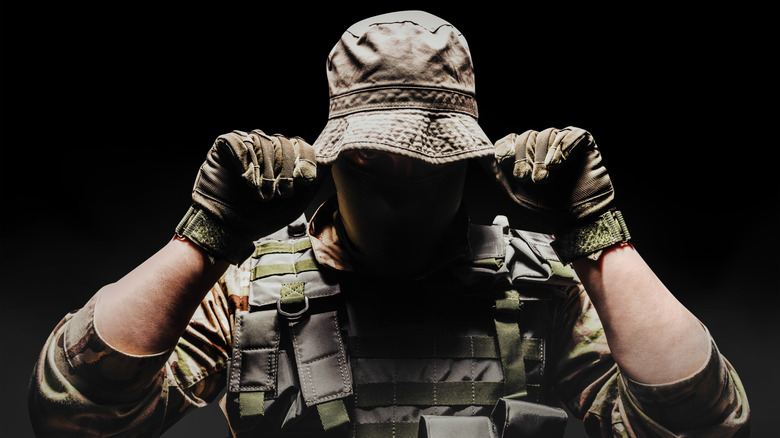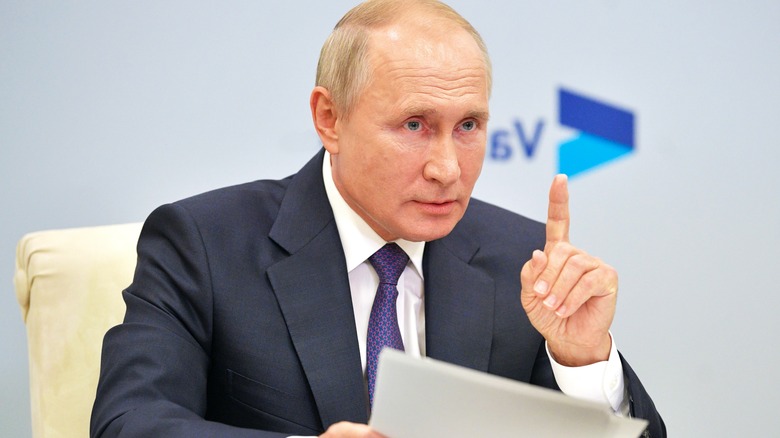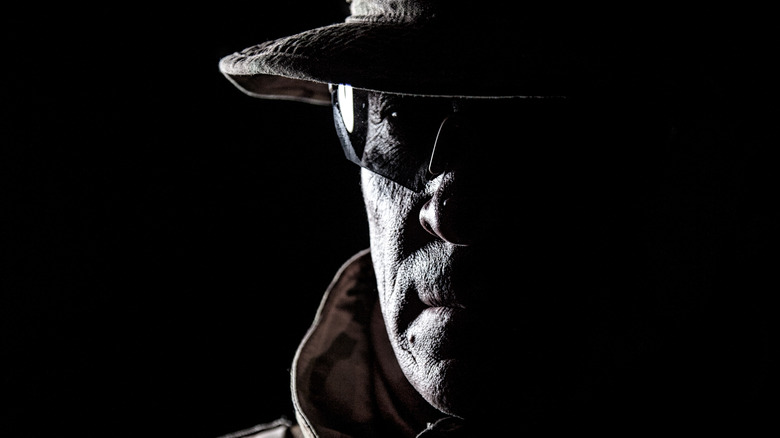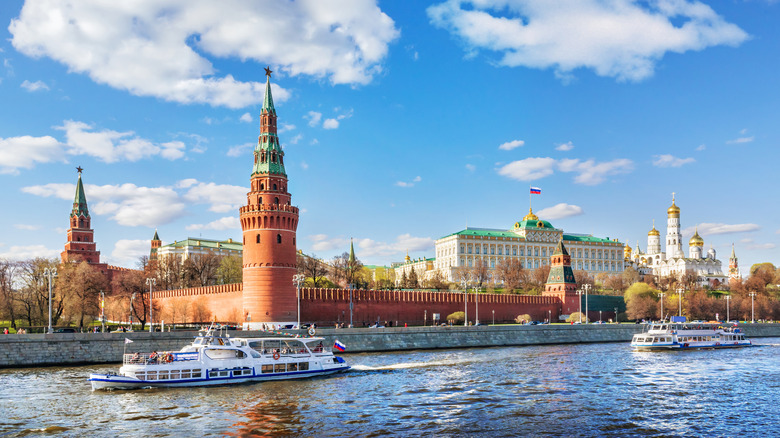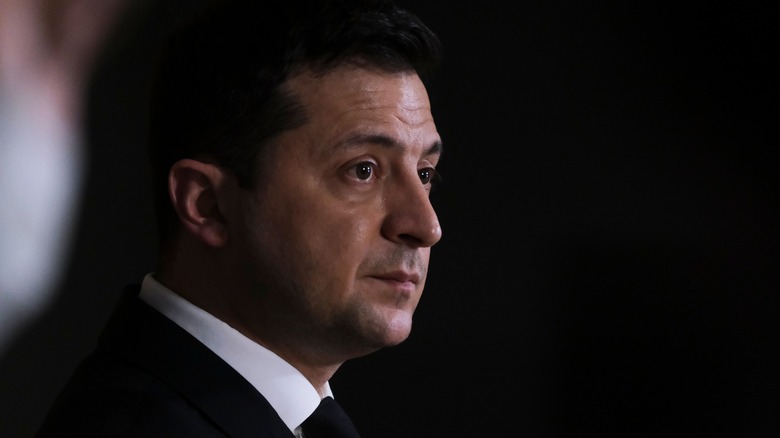Who Are Russia's Mercenaries, The Wagner Group?
In the lead up to Russian President Vladimir Putin's controversial invasion of Ukraine, nearly 200,000 Russian military forces gathered on the border between the two neighboring countries. Since then, Russian forces have swept into Ukraine, fighting fiercely but facing stiff resistance from the Ukrainian people, per New York Post. Reports from high-ranking government agencies such as the U.K.'s Ministry of Defence say there is also a private Russian force involved in the conflict known as the Wagner Group (via Sky News).
Now sometimes called Liga, no one knows for sure exactly what the Wagner Group is, just how it is organized, or who owns the private military company (PMC). It's believed that the Wagner Group has 6,000 employees with operations in Argentina, Hong Kong, and Saint Petersburg. What's also known is that the Wagner Group is real, and reliable intelligence says they're in Ukraine, particularly in the Ukrainian capital Kyiv, their possible objective being the assassination of Ukrainian President Vladimir Zelenskyy himself, as The Economist reports. This shadowy organization could turn the tide in the Russian-Ukrainian conflict.
The Wagner Group doesn't exist
Per The Economist, the head of the UN's working group monitoring the use of mercenaries in international military conflicts, Sorcha MacLeod, has said, "From a legal perspective, Wagner doesn't exist." That doesn't mean that the Wagner Group isn't real, highly trained, and quite often deadly. Put in the simplest terms possible, the Wagner group is not one single organization, but instead a web of companies said to be in league with Moscow, and with alleged close ties to Putin.
In addition to the Wagner Group's possible involvement in Ukraine, there are reports that these quasi-military forces are present in northern and sub-Saharan Africa, where there have been accusations of varied human rights violations levied at the organization, ranging from rape to extrajudicial killings, as The Economist Reports. It's estimated that 400 troops from this proxy Russian force entered Ukraine in the wake of Russia's invasion, but the decentralized nature of the Wagner Group makes it difficult to know for sure.
Putin's private army
Described as "Putin's private army," EU regulators report that the Wagner group was founded by ex-Russian military Dmitry Utkin, who allegedly has Nazi tattoos. He is also said to have named the organization after Hitler's favorite composer, Richard Wagner, as The Economist reports. Utkin and Putin have even been photographed together, proving a link. With no verifiable ties to the Russian state, it's also believed that the Wagner group is funded by Yevgeny Prigozhin.
Prigozhin is the Russian businessman who is also behind Russia's so-called "troll farm," also known as the Internet Research Agency, from where global disinformation on a variety of topics is believed to originate online. Per the Center for Strategic & International Studies, Vladimir Putin, among other Russian government officials, have expressed support for a Wagner Group-like proxy organization representing Russian state interests abroad. It's clear that the Wagner Group is far more than a simple business offering guns for hire.
The Wagner Group offers Russia 'plausible deniability'
Using the "ghost soldiers" from the Wagner Group in Ukraine and elsewhere is advantageous for Putin because it protects the Russian president with plausible deniability, per Sky News. Via Foreign Policy, the Wagner Group is involved in everything from military-like maneuvers, natural resource extraction, and other types of covert operations, such as the infiltration of insurgent organization or even possible assassination attempts in the instance of Ukrainian President Zelenskyy. The Wagner Group is believed to have been on the front lines fighting separatist forces in Mozambique, as Foreign Policy reports,
Networks like the Wagner Group, after all, are made up mercenaries or freelance soldiers, which are typically cheaper to employ than state forces. What's more, proxy groups such as these funded with private money operate without traditional government oversight, are sometimes better trained than regular military, and can be targeted for specific objectives, according to the Center for Strategic & International Studies. This can be done without reporting what the group is up to in the press, and all without disclosing to Russian government officials any losses or casualties they might cause or incur.
The Wagner Group may not be private, after all
Despite the fact that the Wagner Group was formed privately and receives at least some funding from private Russian sources, there is some question about how private the organization really is, according to Sky News. The Wagner Group could instead be a secretive branch of the Russian military that ultimately answers to the Kremlin, despite the Russian government frequently denying any knowledge or involvement in the PMC.
Evidence that the Russian military may in fact be linked to the Wagner Group showed up when Russian military planes allegedly flew Wagner mercenaries to Syria as part of Putin's support of Syrian President Bashar al Assad, according to young Russian men who were recruited to join the operation (via Sky News). The Kremlin has denied this claim, calling any possible Wagner involvement in Syria limited to instructional and advisory roles. The Wagner Group is also believed to have been present in Sudan in the protection of Russian government officials.
The Wagner Group is probably in Ukraine
Evidence of the Wagner Group in Ukraine is not new. Reliable sources say the private military company has long played a hand in destabilizing the disputed Luhansk and Donetsk regions of Ukraine in the interest of Russia. It's now believed that there are hundreds of Wagner Group soldiers active now in Kyiv, and that since late February of 2022 there have been several attempts on the life of Ukrainian President Volodymyr Zelenskyy, per Sky News. Hard curfews were even instituted in the city to contain and curtail their activities.
In early March, Ukrainian forces claimed they killed a soldier with ties to the Wagner Group. To sum up what Ukraine and the rest of the world may be up against, the EU put it plainly: "Wagner Group has recruited, trained and sent private military operatives to conflict zones around the world to fuel violence, loot natural resources and intimidate civilians in violation of international law, including international human rights law" (via Sky News).
